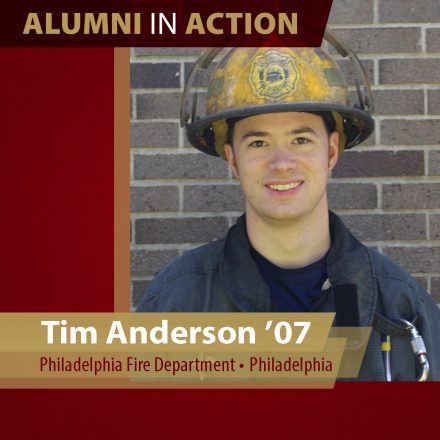A firefighter with the Philadelphia Fire Department, the history major responds to direst medical emergencies in COVID-19 pandemic.
“I’m lucky to have a profession I feel called to, and I’m thankful to have a job,” Tim Anderson ’07 said recently after returning from an emergency call with Philadelphia Fire Department Squad Co. 72.

Anderson chose Elon, where he majored in history, specifically because the town had a fire station by campus. By the end of his first year, he was volunteering for the Town of Elon Fire Department with sights set on a firefighting career in Philadelphia.
COVID-19 has changed the way Philadelphia’s Fire Department operates, but not in the ways we might imagine, he said.
Along with paramedics, firefighters typically respond to hosts of medically related 911 calls: from difficulty breathing, to fevers, to injuries and generalized pain.“Overnight, medical calls dropped 25 to 30 percent,” Anderson said. “No one wants to go to the hospital for any reason.”
To reduce the amount of person-to-person contact during COVID-19, the Philadelphia limited the types of medical calls its fire units respond to. For weeks, Anderson and fellow firefighters have responded only to the direst of medical emergencies, like patients who have stopped breathing or are in cardiac arrest.
But with those calls come closer contact. Anderson said he and others have performed CPR on COVID-19 patients. Even with the extra PPE firefighters are equipped with — including masks and face shields —that level of contact carries risks.
“There’s only so much you can do,” Anderson said. “It’s frustrating dealing with something you can’t see. If it’s blood-borne, at least you know what to avoid.”
When his shift ends, he returns home and immediately removes his clothes to put them in the wash.
As of Wednesday, May 20, Philadelphia counted 20,359 cases and 1,152 deaths among a population of 1.6 million. Anderson is hopeful that the city’s efforts to slow the spread have been successful and is thankful they haven’t seen the spikes in infections and deaths like New York City.
“It isn’t easy, but it’s a lot harder on a lot more people than us,” Anderson said. “A nurse in an ICU: That’s who’s been hit hardest. They deserve the attention. They are on the front lines.”
About this series: The Elon Alumni in Action series explores the stories of university graduates who are doing important and uplifting work as the world faces the COVID-19 pandemic.


